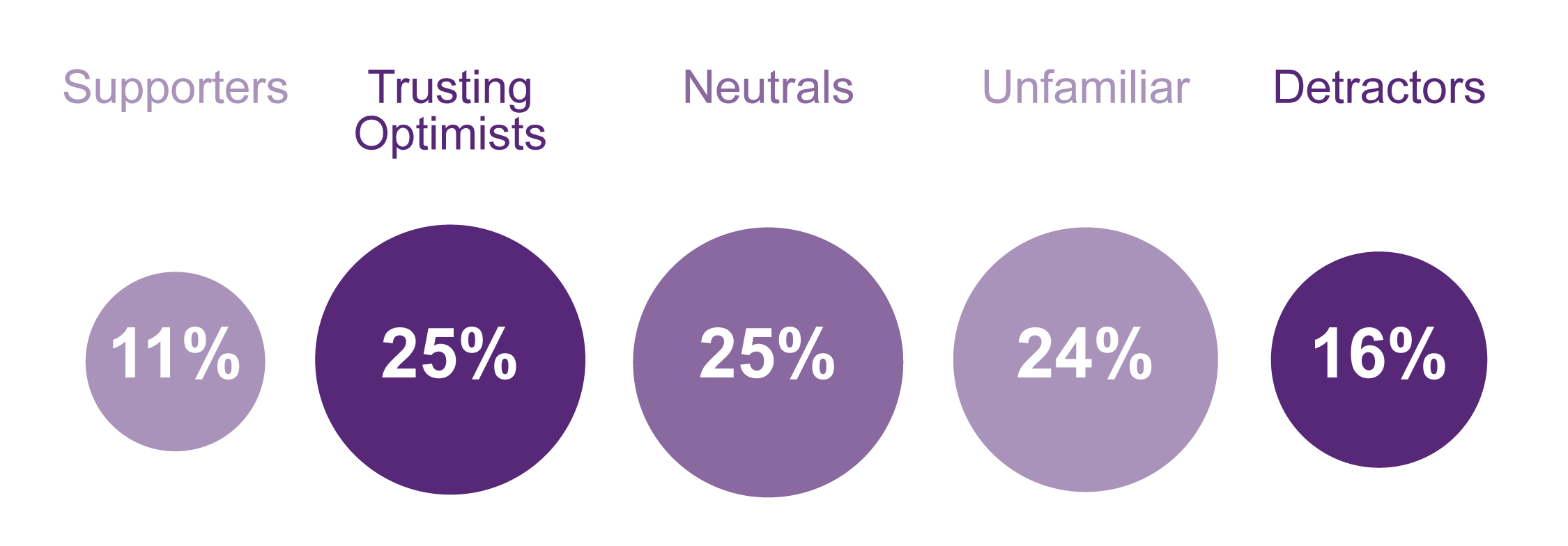General Public: Segmentation overview
Read more about the five discreet groups of people with similar views of the sectorWe’ve used cluster analysis* to look at respondent scores across all statements to segment them into distinct and identifiable groups. These groups can provide a basis for targeted messaging to raise awareness of the sector’s perspectives and actions.


![]()

Supporters
Supporters have highly positive perceptions of pharmaceutical companies operating in the UK. They are highly familiar with the sector and their support is universal: they are more likely to rate the sector positively across all the reputation KPIs (Favourability, Trust, Advocacy) and detailed drivers of trust than any other segment.
Supporters are more likely to be male and live in the North and Northern Ireland than the population as a whole. They are also more likely to watch television to stay informed than the public overall, as well as read printed newspapers and use mobile news alerts. Supporters have an interest in world issues and events, enjoy discussing these with friends and family and share their opinions on social media. They seek out information about the sector and are willing to get a COVID-19 vaccine if it were available to them.
You can read more about Supporters here
![]()
Trusting Optimists
Trusting Optimists rate pharmaceutical companies operating in the UK higher than average across all the attributes that fall into the “Reliable and Responsible” driver of trust. Overall, they trust the sector and give it the benefit of the doubt. They tend to believe that the sector has high ethical standards, is transparent about clinical trials, provides access to medicines and minimises its environmental impact. This converts into higher than average scores across all KPIs (although lower than among Supporters), but they only have average knowledge and perceptions of the sectors’ performance in detail.
This group is more likely to be older (55-75) than the sample as a whole. They have an interest in world issues and events and enjoy discussing these with friends and family and share their opinions on social media. They seek out information about the sector more than the national profile and say that people often ask for their opinions. They are more likely to seek out information using multiple sources, including printed newspapers such as the Daily Mail and local ones. They are more likely to say they would get the COVID-19 vaccine if it were available than the public as a whole.
You can read more about Trusting Optimists here
![]()
Neutrals
Neutrals are slightly less familiar with the sector than the wider public and are neutral towards it across all drivers of trust and the headline reputation metrics of Trust and Advocacy.
They are more likely to be older (55-75 years old) than the national profile. Their main sources of news in general are TV, online newspapers and the radio. They are interested in world issues and events and share their opinions with family and friends, but are less active on social media. This group is less likely to seek out info about pharmaceutical companies operating in the UK and discuss pharmaceutical related issues with others.
You can read more about Neutrals here
![]()
Unfamiliar
This group is defined by their lack of knowledge of the sector. 45% of people in this segment say they know almost nothing about pharmaceutical companies operating in the UK. Given their limited knowledge of the topic, this group often don’t have an opinion of the sector across a range of issues. This limited sector knowledge and ability to form opinions of it means that they are less able to rate the sector. This leads to scores that appear below the average, due to many responding ‘don’t know’ to our questions.
This group is more likely to be female, younger (18-44 years old) and live in the South than the national profile. They tend to get their news from television, online newspapers and the radio, but to a lesser extent than the public overall. They are less interested in public affairs and pharma related news than others, and unlikely to share and discuss their opinions about these. They are also less likely to say they would get the COVID-19 vaccine if were available to them.
You can read more about Unfamiliar here
![]()
Detractors
Detractors distrust the sector and are the most critical of it. They have negative perceptions of the sector across the umbrella factors that drive trust: being “Reliable & Responsible” and “Ethics & Transparency”. They have considerably higher levels of disagreement with most aspects of image and performance than any other group. They are less likely than others to believe the sector ensures medicines are safe or effectively communicates possible side effects.
Detractors are more likely to be male and older (45-75 years old). They are more likely to use online newspapers (with The Guardian being their first choice) and the radio to keep informed. While they are interested in politics and current affairs and enjoy sharing their opinions with others, they are unlikely to seek out information about the pharmaceutical sector or have conversations about it. Just under one in five (17%) people within this group say they would not get a COVID-19 vaccine if it were available to them – a higher level of disagreement than the national average (7%).
You can read more about Detractors here
*Cluster analysis is a classification method which uses a number of mathematical techniques to arrange sets of individuals into clusters. The aim is to establish a set of clusters such that individuals within a given cluster are more similar to each other than they are to individuals in other clusters. The technique reveals associations and structures in the data which were previously undefined.
![]()
Last modified: 17 October 2024
Last reviewed: 17 October 2024
